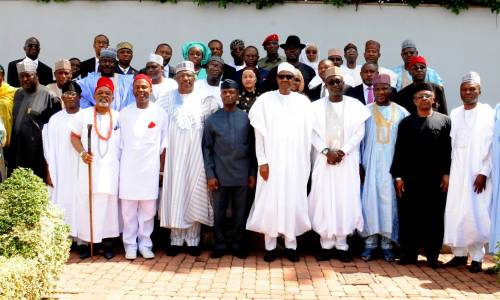Ministers in Nigeria will render the first report on their performance on the mandates outlined for them by President Muhammadu Buhari in December this year.
The Ministers were sworn in and assigned their portfolios in August with President charging them to work to implement the policies of government to ensure security, grow the economy and fight corruption.
Vice President Yemi Osinbajo, who spoke at the 2019 National Annual Conference of the Nigerian Institute of Management, NIM, said this would be part of what “will be done differently on implementation of government plans in this dispensation.”
According to him, President Buhari developed mandates that the ministers were required to meet in the 2nd Term of his administration.
“After the Presidential Policy Dialogue preceding the inauguration of Ministers, the President developed a list of specific mandates for each ministry.
“Each of those mandates had clearly spelt out action points. The ministers are to render their first reports on performance in December.”
Osinbajo said the full and effective performance of the mandates by the ministers is an implementation challenge, requiring the contributions of the NIM on the journey.
Speaking on the theme of the NIM 2019 Conference, “Managing the Challenge of Democracy,” Osinbajo said that the central question in Nigeria, especially in the private sector at present, “is not the lack of talent or well researched policies, but the weakness in getting things done, or implementation, doing things as opposed to talking about doing them.
“Implementation is possibly the central management challenge today. And it is in my respectful view at the heart of the challenges of managing our democracy.
“So in every real sense our problem is a management one. If the NIM achieved nothing else but a prescription on how to resolve the problem you would certainly deserve to be described as national heroes.
“But to take the prize you will need to ensure implementation beginning with your members.”
The Vice President outlined fives issues for the consideration of the NIM that would be necessary in their contribution to the deepening of democracy in Nigeria.
“First is the central question of governance, ethics in the management of public resources; second is the issue of merit over quotas and politics in the selection of talents and projects; third are the challenges in human capital development; fourth is the problems of scale, scale in social services for example education, providing 21st century relevant education to millions of children as the country heads for third place in world population.
“Last but by no means the least is the problem of poverty, and the creation of wealth and opportunity for millions.”

He said government’s approach to the first issue has been to tackle grand corruption and changing systems that promote graft.
Osinbajo said the implementation of such policies as the Treasury Single Account, TSA, the Whistleblower, the Integrated Personnel Payroll Information System, IPPIS, among others, has helped government to tackle corruption.
The vice president also spoke on government programmes on health and education, pointing out the allocation of 1% of the Consolidated Revenue Fund, CRF, to healthcare in 2018, and the launch of the first phase of the Basic Healthcare Provision Fund with the disbursement of N6.5 billion to the first 15 qualifying States and the FCT.
“The next level is the implementation of compulsory health insurance for all Nigerians on a co-payment basis with government.
“We are working at the level of the National Economic Council to achieve the president’s June 20th charge to State governors to ensure full implementation of free and compulsory education in the first nine years of the school life of every Nigerian child.”
Earlier in his address of welcome, the President of the NIM, Olukunle Iyanda, said that the annual conference of the institute provides platforms to critically examine government programmes and policies with a view to making inputs that could help government to achieve them.





